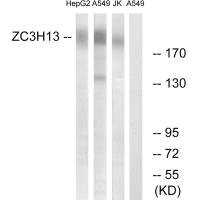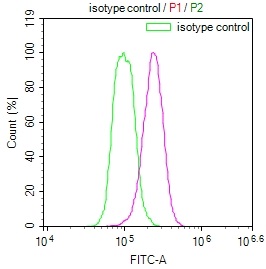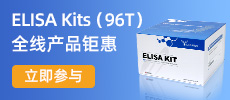ZC3H13 Antibody
-
中文名稱:ZC3H13兔多克隆抗體
-
貨號:CSB-PA921508
-
規(guī)格:¥2024
-
圖片:
-
其他:
產(chǎn)品詳情
-
產(chǎn)品名稱:Rabbit anti-Homo sapiens (Human) ZC3H13 Polyclonal antibody
-
Uniprot No.:
-
基因名:ZC3H13
-
宿主:Rabbit
-
反應(yīng)種屬:Human,Mouse
-
免疫原:Synthesized peptide derived from internal of Human ZC3H13.
-
免疫原種屬:Homo sapiens (Human)
-
克隆類型:Polyclonal
-
純化方式:The antibody was affinity-purified from rabbit antiserum by affinity-chromatography using epitope-specific immunogen.
-
濃度:It differs from different batches. Please contact us to confirm it.
-
產(chǎn)品提供形式:Liquid
-
應(yīng)用范圍:ELISA,WB
-
推薦稀釋比:
Application Recommended Dilution WB 1:500-1:3000 -
Protocols:
-
儲存條件:Upon receipt, store at -20°C or -80°C. Avoid repeated freeze.
-
貨期:Basically, we can dispatch the products out in 1-3 working days after receiving your orders. Delivery time maybe differs from different purchasing way or location, please kindly consult your local distributors for specific delivery time.
-
用途:For Research Use Only. Not for use in diagnostic or therapeutic procedures.
相關(guān)產(chǎn)品
靶點詳情
-
功能:Associated component of the WMM complex, a complex that mediates N6-methyladenosine (m6A) methylation of RNAs, a modification that plays a role in the efficiency of mRNA splicing and RNA processing. Acts as a key regulator of m6A methylation by promoting m6A methylation of mRNAs at the 3'-UTR. Controls embryonic stem cells (ESCs) pluripotency via its role in m6A methylation. In the WMM complex, anchors component of the MACOM subcomplex in the nucleus. Also required for bridging WTAP to the RNA-binding component RBM15 (RBM15 or RBM15B).
-
基因功能參考文獻:
- This study identified ZC3H13 significantly associated loci with a biologically plausible role in schizophrenia. PMID: 24507884
-
亞細胞定位:Nucleus speckle. Nucleus, nucleoplasm.
-
數(shù)據(jù)庫鏈接:
Most popular with customers
-
-
YWHAB Recombinant Monoclonal Antibody
Applications: ELISA, WB, IHC, IF, FC
Species Reactivity: Human, Mouse, Rat
-
Phospho-YAP1 (S127) Recombinant Monoclonal Antibody
Applications: ELISA, WB, IHC
Species Reactivity: Human
-
-
-
-
-




















